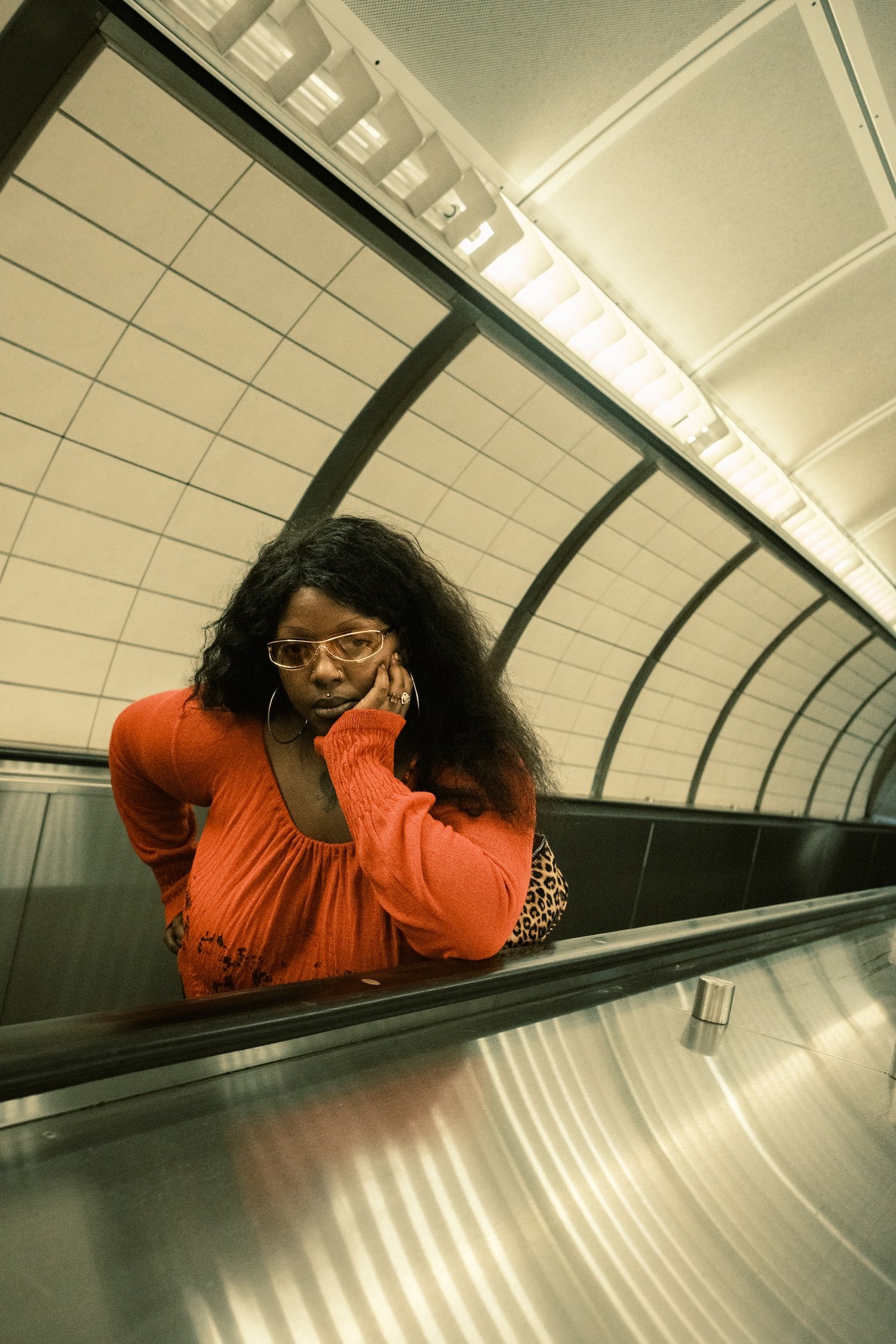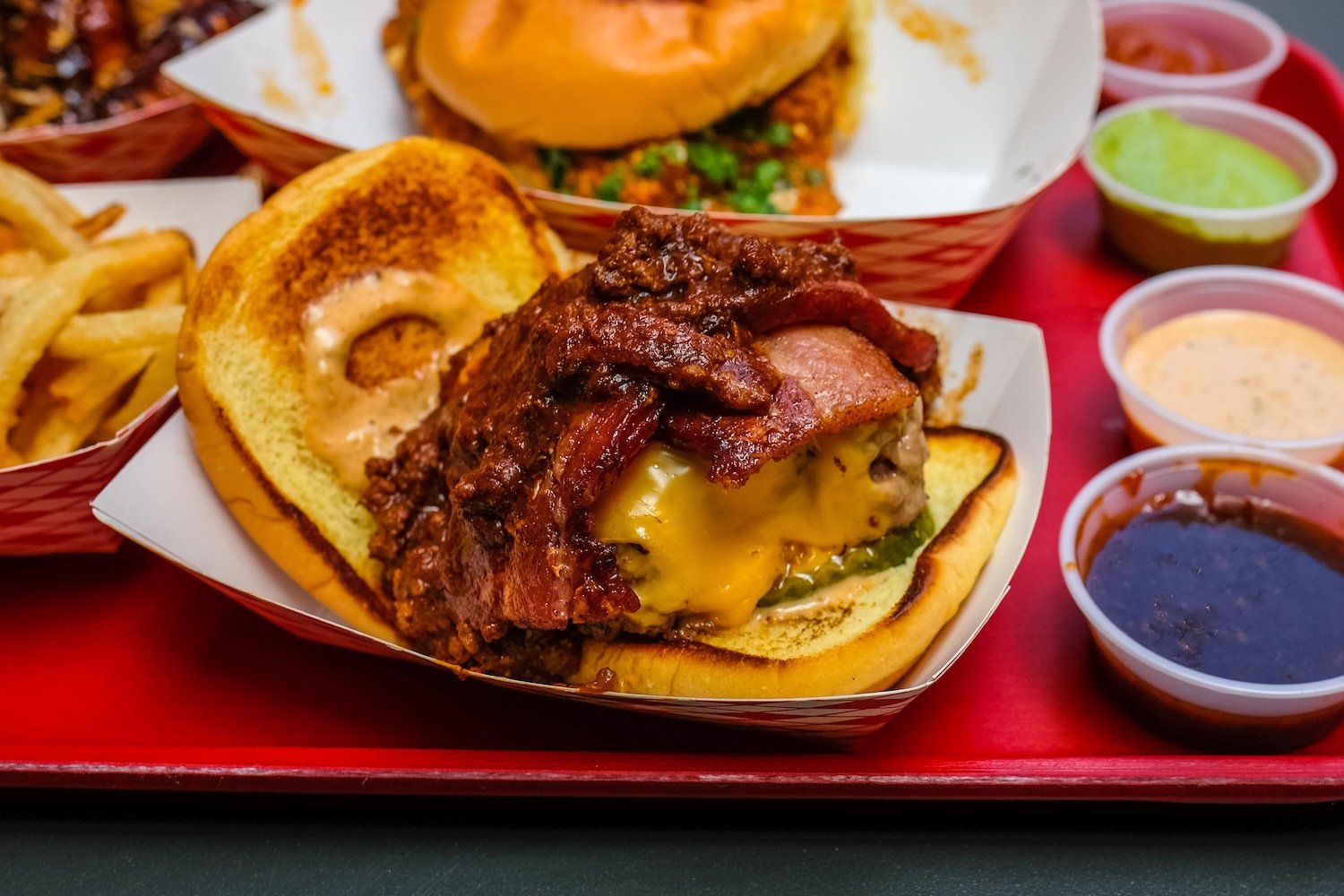
KeiyaA Can’t Turn Back Now

I met KeiyaA on a light afternoon in early October in the restaurant below her apartment on Manhattan’s west side. She walked in soft-spoken but fully present—the kind of person who makes silence feel like a concerted choice. Outside, the city’s humming; inside, she’s talking about her new album, Hooke’s Law, due out on Halloween—a date fitting for an artist actively processing what haunts her.
KeiyaA’s sophomore full-length, following 2020’s Forever, Ya Girl, is a dense, feverish exploration of shadow work, anger, sexuality, and trauma. It’s darker, faster, more volatile than its predecessor, but also freer. The title, KeiyaA noted over a bowl of ramen and chicken curry, comes from physics. “Hooke’s law essentially means ‘a downward spiral is a loaded spring,’” she explained. “It’s like the force that a spring pulls downwards, opposite to momentum. You go through hell, you spiral, and then you fly forward.” That spiral, of falling apart and circling back, runs through every corner of Hooke’s Law. Its compositions, full of redolent synths, distorted basslines, and the singer’s unmistakable vocal layering, are at once spiritual and defiant, confronting the past without smoothing its edges.
It translates well, but through considerable effort, to the stage, too. The shows feel like a ritual, whether she’s performing at Little Island, literally floating above the Hudson, or stealing the crowd as an opener for Ravyn Lenae in Terminal 5. Her voice, at times raspy and smothered, then buttery and with innuendo, moves through space with an agenda. It can break you down, build you back up, and leave you a little raw, but certainly more alive.

Photo by Javier E. Piñero
When Forever, Ya Girl dropped in 2020, KeiyaA’s world changed overnight, or at least it seemed to. Released in the thick of pandemic lockdown, the album became a cult favorite almost instantly, appearing on every cool publication’s year-end list and landing co-signs from JAY-Z, Kelela, and Solange. “I just became, like, insanely popular by my own standards,” she recalled. “Like, I became a professional musician.”
But as her name buzzed across the internet, reality lagged behind. “I didn’t even have WiFi when I uploaded that album,” she says. “I was crashing at my friend’s house, who didn’t pay the internet bill, so I had to go downstairs to find WiFi. I didn’t have a job. I just wanted to start releasing music again—and make some money to survive.”
Success came wrapped in contradictions. On one hand, she had critical acclaim, fans, and all the stamps a budding musician could hope for (she performed as part of a curated series Solange put together for the Brooklyn Academy of Music in 2023)—on the other was the isolation. “It’s pretty lonely,” she admitted. “But it’s a certain type of loneliness I’m used to. I’d rather be lonely and transient, moving around different people, than lonely in the same house with the same energy all day.”

Photo by Javier E. Piñero
That ethos, of moving with intent and direction, bleeds in and out of Hooke’s Law. Where her debut album irradiated the surface layers of sadness with psalms, mantras, and affirmations, her new work dives headfirst into the mess of it all. “I’ve carried a lot of childhood trauma into adulthood,” she said. “My internal world was violent, and the external world mirrored that. After Forever, Ya Girl came out, the depression came back heavy. So this album was about interrogating those feelings instead of trying to heal from them. Like, let’s look at the darkness. Let’s give those parts a voice.”
Darkness takes myriad forms on Hooke’s Law: grief, rage, and maybe especially, horniness, which, for KeiyaA, is its own form of resistance. “This is still a self-love album,” she said, “but from a different angle than, like, ‘You’re a Black queen, take a bath and light a candle. Nah. This is like—scream, cry, break glass, kick shit over. Let yourself fall apart. Look at yourself in the mirror when you’ve fallen apart and ask, ‘What did I do wrong?’”
On her latest, those feelings get texture, sound, and breath. Her voice shifts from withered and distant to crisp and confrontational. The production, sharper and more experimental than on her debut, follows a similar pattern, with skittish bass theories crumbling under airy, sprawled-out harmonies, as if the songs themselves are trying to hold it together. But the album is also sensual, deliberate, and sometimes, political. “For Black women like us, naming emotions like anger or desire is radical,” she said. “It’s kind of an anti-mammy thing, honestly. Like, I’m not here to take care of everybody else’s feelings first. I wanted to make music where I could be messy, selfish, even horny, and not feel ashamed about it.”
Hooke’s Law sounds like that rebellion. Tracks like “think about it/what u think?” throb with electronic chords and a pulse that hints at New York drill—frenetic, lustful, living. Elsewhere, she stretches time, stacking her voice into a cloud of sound, hovering somewhere between gospel and ghostly.
While much of the album centers on personal, internal tragedies, it also touches on external, no less profound, sources of injury. In 2023, KeiyaA’s brother was murdered, a loss that reverberates throughout Hooke’s Law, but especially on the final track, “until we meet again.”

Photo by Javier E. Piñero
“Why is he gone, and I’m still alive? Why was he murdered when he tried to put his whole heart on the line?” she sings.
“His presence is throughout the record,” KeiyaA said quietly. “My family is very patriarchal—the women carry everything, but the men are still coddled in a way.”
“He was coddled, and I was sent off to figure life out on my own. I loved him, but I resented him, too,” she confessed. “Then he started making music, and we kind of came together. It’s complicated grief. I think I’m still figuring out where to put all that.”
If Forever, Ya Girl was KeiyaA’s introduction to the world, Hooke’s Law might be a reckoning—a project made by someone who’s seen both sides of visibility and decided survival is still the goal. “I’ve been through the spiral so many times,” she said, “but this time feels different. I don’t know what it is yet, but I’m clinging to it for dear life.” Her days, she’s learned, are quieter when not working or touring. There’s also therapy, small routines, and sunlight when she can get it, even if it’s reluctantly. “The worst news for me was that sunlight and walks actually help,” she said. “But it’s true—getting up, moving, doing something, even if it’s just going to work. The chemicals start moving. It’s annoying, but it works.”
As she readies the release of Hooke’s Law, KeiyaA is more grounded than ever; not necessarily at peace, but certain. The spiral has taught her that clarity doesn’t always mean calm—sometimes it’s just the courage to keep churning. “I kind of put myself to this test after making this album,” she said. “I have to live in my anger. Now I have to embrace my desire. Now I can’t people-please anymore. And so what I’m learning is like, there’s no turning back now. I cannot do the things that I was doing before I made this.”
The post KeiyaA Can’t Turn Back Now appeared first on BKMAG.




